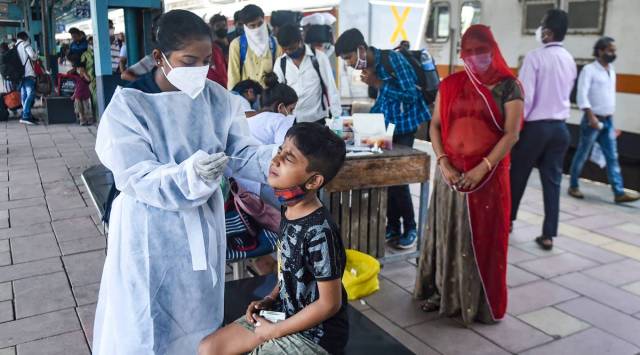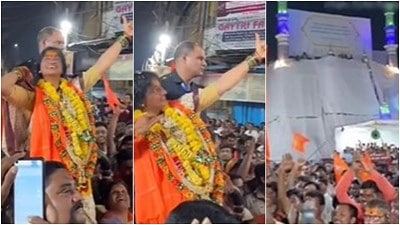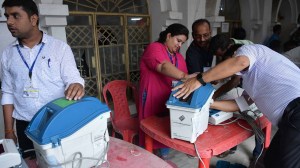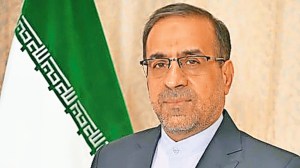- India
- International
Mumbai stands out despite recording high number of cases
During the reconciliation exercise, Mumbai reported no deaths that took place beyond a week. The city recorded more than 4 lakh cases in the second wave, recording over 3,600 deaths since February 9.
 A BMC health worker takes swab sample of a child passenger for COVID-19 test, at Dadar railway station in Mumbai. (PTI)
A BMC health worker takes swab sample of a child passenger for COVID-19 test, at Dadar railway station in Mumbai. (PTI)Overwhelmed by the second wave of the pandemic and facing a host of other issues such as lack of trained manpower and technical hurdles, many districts in Maharashtra have lagged in real-time reporting of Covid-19 deaths. But Mumbai has stood out for its prompt reporting of deaths, despite dealing with the highest toll across state.
Maharashtra has added 29,969 Covid-19 deaths since May 10 to its tally. State officials said a large number of these deaths are in fact from April when the state battled its peak and district offices could not find the time to report each death on a daily basis.
The Union government uses a Covid-19 portal to record deaths and CV analytics portal to report cases. An app is also shared with each hospital to feed patient reports, including death and discharge.
The delay in reporting in April and May has piled up death reports. In some cases, the data from the state and the Covid-19 portal differs. The state undertook a massive reconciliation exercise last month, asking all districts to start reporting deaths from previous months. The overall toll across the state at present stands at 1.06 lakh.
On Friday, Maharashtra reported 2,213 Covid-19 deaths from previous months, the highest in a day as part of data reconciliation.

Data since June 1 shows Pune reported maximum number of deaths that occurred more than a week ago in its jurisdiction (1,368), followed by Thane (1167), Nagpur (503), Nashik (486), Ahmednagar (534) and Aurangabad (184). Smaller districts like Nanded reported 152 deaths from previous weeks, Yavatmal (230), Raigad (135), and Kolhapur 129.
During the reconciliation exercise, Mumbai reported no deaths that took place beyond a week. The city recorded more than 4 lakh cases in the second wave, recording over 3,600 deaths since February 9.
The city’s reporting system goes back a year when newly-appointed Municipal Commissioner Iqbal Singh Chahal directed all hospitals to report Covid-19 deaths in 24 to 48 hours to BMC’s epidemiology cell. The wake up call came in early June 2020 when BMC found that over 1,200 deaths across all hospitals were pending to be reported.
“Last year on June 6, Somaiya hospital reported 16 deaths. I was shocked how could 16 deaths happen in a day in a single hospital. On inquiry, we found that the hospital had reported deaths that occurred in March, April and May. On June 8, I instructed all hospitals to come clean and report all previous deaths,” Chahal said.
On June 16, 2020, BMC added 862 deaths to its Covid-19 toll and 347 deaths to “death due to other causes’ category. The “other causes” category pertained to Covid-19 patients who died due to terminal illness or by accident.
With that, Mumbai’s death rate surged from 3.7 per cent to 5.2 per cent, zooming past then national average of 2.8 per cent.
Chahal said he directed all hospitals to report deaths within 48 hours or face action – from a showcause notice to closure. “It took us the entire July to bring the system in place,” he added.
Dr Jeetendra Jadhav, medical officer in Kurla, said a rise in Covid-19 cases meant extra and long working hours for the BMC health department. “Covid-19 is on top priority for all ward officials. Last year, we held a meeting with general practitioners to explain the need to report suspected Covid-19 deaths. Communication is the key, we explained to them the importance of accurate data,” Jadhav added.
In the second wave starting February, Mumbai had a robust reporting system running. Hospitals report their deaths online to BMC’s epidemiology cell, which then combines the statistics and reports to the state government. Hospitals are also supposed to report on online app about patient’s demise or discharge.
“BMC has decentralised the entire system to the wards. The division of work has fastened response time,” a state official said. A ward-level official added, “Not only deaths, follow-ups are done even with testing laboratories to ensure they give reports within 48 hours.”
Chahal said that most other districts, specially rural areas, were not hit by the first wave and hardly got time to set up a system of reporting.
State epidemiologist Dr Pradeep Awate said smaller municipal corporations do not have the kind of manpower that BMC possesses. “For instance, Chandrapur corporation lacks technical know-how and enough staff for data entry,” he added.
Awate said private hospitals have been found delaying reporting deaths. “In case of delay at the hospital level, the information is collected at the district level and uploaded on the Covid-19 portal. But this process often takes long. As a result, some reports of deaths keep pending for a long time,” he said.
Districts officials said that in April and May, death reporting took a backseat due to high number of patients, oxygen and drug crisis as well as shortage of beds.
Apr 18: Latest News
- 01
- 02
- 03
- 04
- 05






































